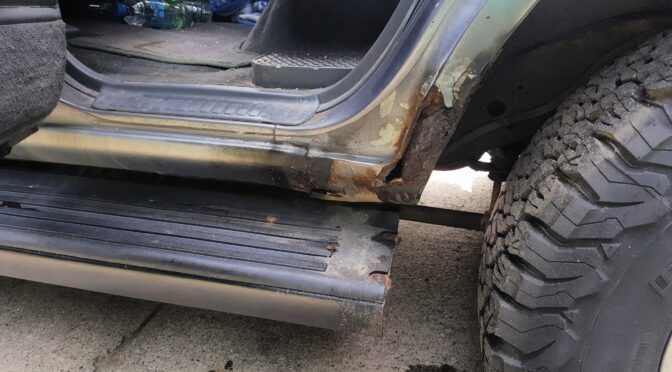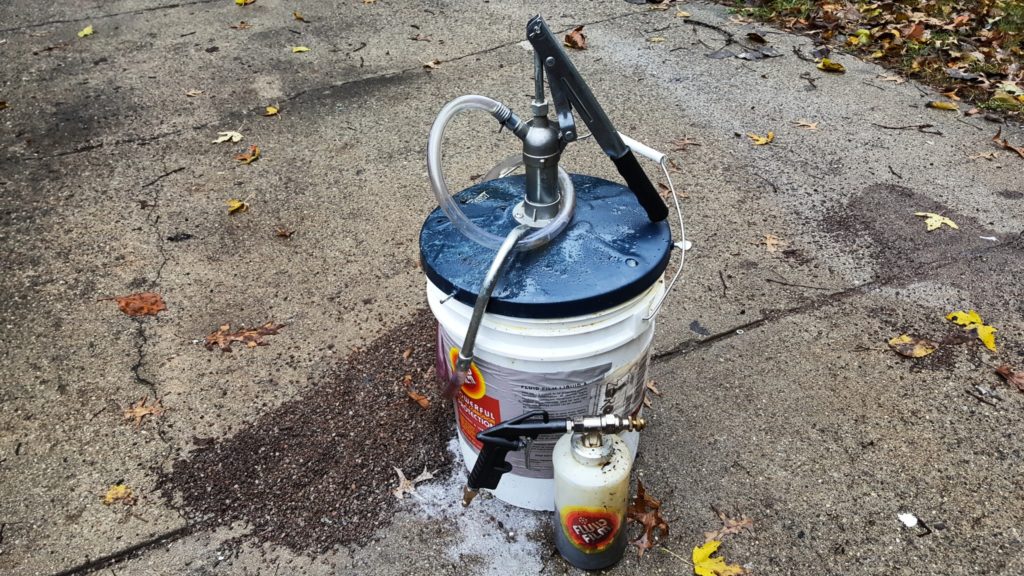We recently bought a new van and I wanted to undercoat it so it would last — being old school that was the first thing I thought of anyways. The next was to do some searching around with Google about undercoatings so I could get the best product to use. You know what I found out? When most cars and trucks are made, the manufacturers do a ton of stuff now to prevent corrosion straight from the factory – so much so that you may find it hard pressed to find a shop that even does undercoating/rust proofing any more. The car companies have improved their alloys, finishes and even learned not to leave exposed lips for mud to settle in to and sit – think about how the old wheel wells had the reinforcing lip all the way around that dirt/mud could sit in and hold salty water or even just water against the metal – of course it would rust. So now you look in to wheel wells and through one method or another that flange is either not there or protected.
So I want to share some things I learned. First, rubberized spray on undercoatings often caused more problems than they solved. Now, you may be wondering why – I know I did. You see, it is a spay on finish the adheres to whatever surface it can stick to – paint, rubber, metal, dirt, etc. Over time, that undercoating develops small holes from stuff hitting it and then a pocket starts to form, salty water enters in and is held against the very steel it is trying to protect! So to make a long story short, after reading tons of posts about the various spray on rubber undercoatings one must conclude they are not worth investing in any longer.
Second, rust proofing sounds great but there really is no such thing. You are delaying the inevitable if we are talking about steel and salt water – eventually something is going to rust.
Okay, enough doom and gloonm, let’s say you live in a state, like Michigan, where they salt the heck out of the roads in the winter. What do you do to protect new cars even more than what the factory did *or* you want to try and save older vehicles even if they have started to rust? The answer, interestingly enough, was developed long ago – Fluid Film. Eureka Chemical Company, yes that really is their name – started in the 1940s when they developed a product with an unlikely source to help the Navy prevent corrosion – the not-so-secret ingredient is lanolin from sheep. If you want to read the whole story, click here.
Let me cut to the chase – the reason this stuff works is that it oozes and seals itself if nicked. DoD, NASA, Coast Guard, Delta and others are still using this stuff! After doing a lot of reading, I bought a five gallon pail off Amazon, an applicator gun and a pail pump dispenser. They sell an aerosol can version but I really don’t have much experience with it but am a bit leery of it because the liquid is so thin that comes out compared to what I can spray with the applicator gun.
This is my second year using it on our vehicles and it almost makes it a few months before you can tell it has dried out / faded. In other words, it doesn’t quite make it the whole winter. I get rid of looser dirt by spraying it down, let it try and go to town spraying this stuff on everything – even the exhaust as it will just bake off after the first time it gets good and hot.
Honestly, I think the FuildFilm helps – our newest car after our van is a 2002 Camry and I spray the heck out of it and our other older cars (the oldest is a 1992 Corolla) and my old 1996 Land Cruiser. I go through about a quart per car/truck liberally applying it real thick all over the under carriage. I also spray door hinges, locks and hood latch. The stuff smells funny for the first day or so but seems to really do the trick. I just finished putting it on our vehicles for the second year. I’m about half way through the five gallon pail so if you want to test it out some, you could start with a gallon pail – that would do 4-6 cars or trucks depending on how thick you apply it.
So, thought I would pass along what I learned – don’t bother with rubberized undercoatings and definitely check out FluidFilm.
Note, my local Autozone also sells the below aerosol cans. I really do not know how long it will protect what you spray it on. It is way, way thinner than the stuff that comes in the pails.
If you find this post useful, please share the link on Facebook, with your friends, etc. Your support is much appreciated and if you have any feedback, please email me at in**@*********ps.com. Please note that for links to other websites, I may be paid via an affiliate program such as Avantlink, Impact, Amazon and eBay.

